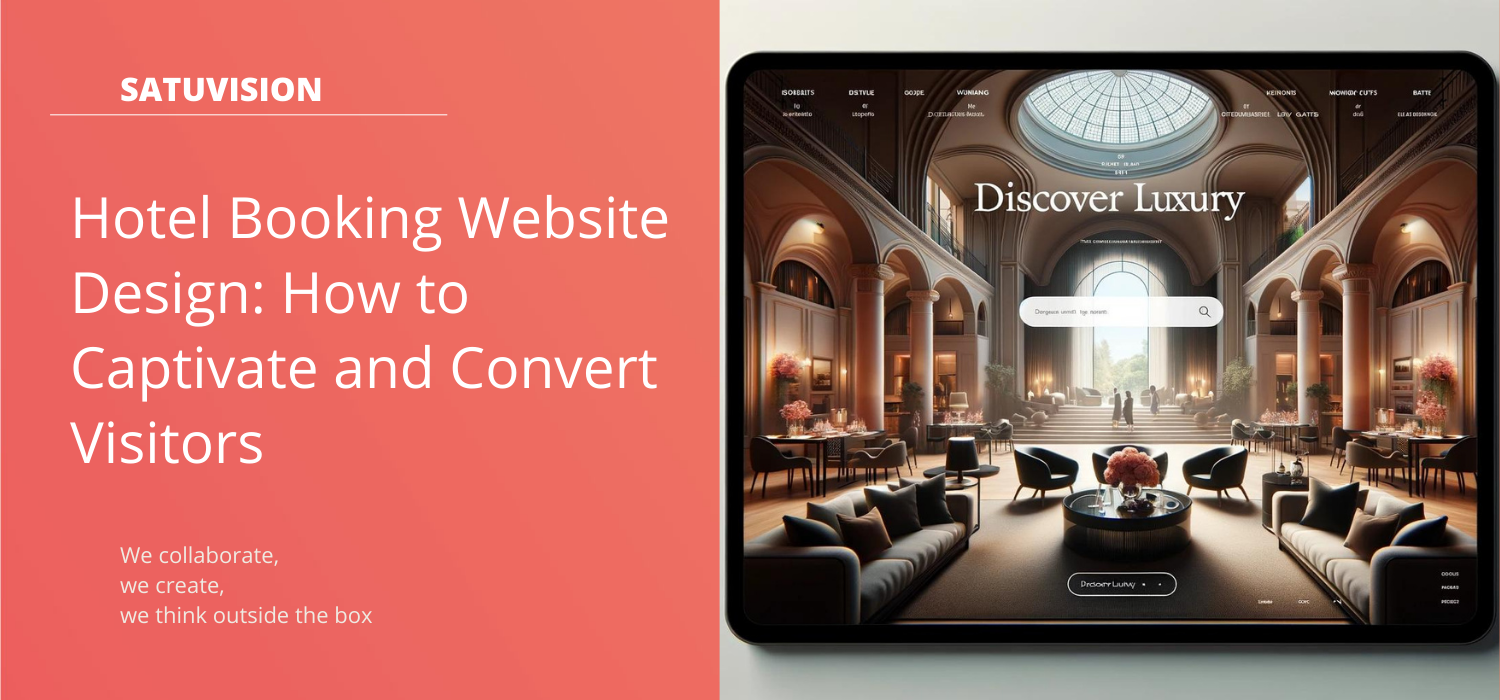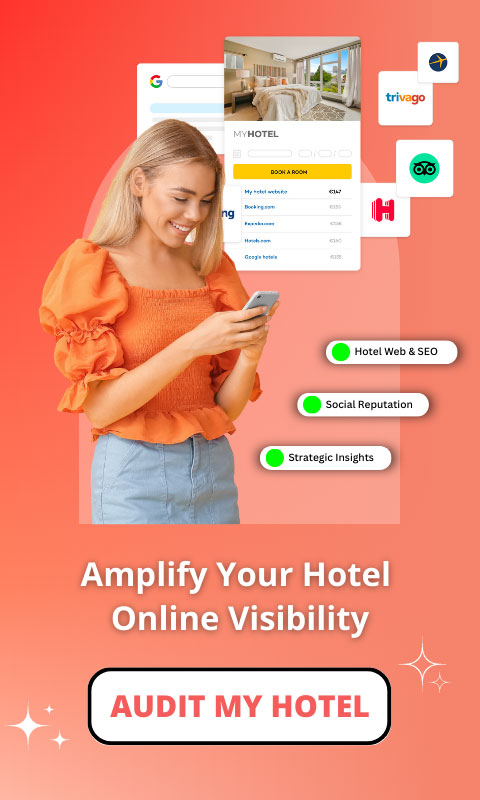The Hotel booking website design is the front gate to attracting and retaining customers. One recent study found that over 75% of the respondents book hotels online through hotel websites, online applications, and third-party booking websites.
As a hotel owner or executive, it’s important to understand that website design plays a significant role in shaping how visitors perceive your business.
A well-designed hotel booking website can greatly enhance user experience and positively impact your business. Therefore, paying close attention to your website’s design is crucial to attracting more customers and increasing revenue.
To create a perfect hotel booking experience, learn about key elements for success in optimizing your hotel booking website design through this blog.
Table of Contents
Hotel Booking Website Design: Key Elements to Drive Booking Success
First impressions matter immensely in the digital space. For a hotel booking website, the aesthetic appeal is not just about looking good; it’s about evoking emotions, setting expectations, and creating an immersive experience.
A study exploring the Impact of Aesthetics on Web Credibility reveals that the visual appeal of a website significantly shapes a user’s initial perception of its credibility. Another research indicates that appealing aesthetics not only leads to heightened customer satisfaction but also plays a pivotal role in influencing impulsive buying decisions.
Imagine you are a guest looking for an experience as the main purpose of booking a room in a hotel. Of course, the hotel’s aesthetic appeal helps inspire guests to book a room.
So, a thoughtfully designed hotel booking website with appealing aesthetics is crucial for establishing trust, enhancing user satisfaction, and encouraging bookings.
Visual Harmony
Color, imagery, and typography should align with your brand’s identity and ethos. A harmonious visual layout not only pleases the eye or provides a seamless user experience but also conveys one of the most essential things to building your hotel: Branding.
Yes, visual harmony throughout the website is essential to convey a coherent message through imagery.
For example, Color schemes should be consistent with the hotel’s positioning, target audience, and the emotions the hotel wants to convey.

One of our clients, Deep Roots, targets a demographic interested in eco-friendly practices, relaxation, diving, and high-quality experiences. Upon learning this, our team designed the website’s color scheme to evoke calm, relaxation, and a deep connection to nature. This was achieved by incorporating earthy tones, greens, and blues throughout the website.
The website’s color scheme is designed to evoke feelings of calm, relaxation, and a deep connection to nature, which is perfectly relatable to its target audience.
High-quality images of the hotels, rooms, and amenities should be prominently featured, creating a visual narrative that guides the user through what they can expect during their stay.
READ MORE: 12 Steps to Increasing Direct Bookings
Branding Consistency
Do you know your website is an extension of your hotel’s brand? Consistent branding across all pages reinforces your identity and builds trust.
This includes using a consistent color scheme, logo placement, and font styles that align with your hotel’s character and market positioning.
To achieve branding consistency on a website, you can try the following strategies:

- Visual Elements: Use consistent colors, fonts, and imagery throughout your website. This creates a cohesive visual identity that strengthens brand recognition.
- Logo Placement: Ensure your logo is prominently displayed on each page. Consistent placement reinforces brand familiarity and helps users identify your site.
- Typography and Font Choices: Stick to a set of fonts that align with your brand identity. Use consistent typography for headings, subheadings, and body text to maintain a professional and uniform appearance.
- Branded Imagery: Employ consistent styles, filters, and themes for images to maintain a cohesive visual language. This helps in reinforcing the brand’s personality
- Messaging Tone and Voice: Establish a consistent tone and voice in your written content. Whether it’s formal, casual, or playful, maintain this style across all pages to create a unified brand voice.
- Navigation and Layout: Keep a consistent navigation structure and layout across the website. This helps users navigate seamlessly and reinforces a sense of familiarity with your brand.
- Consistent Branding Elements: Use consistent branding elements such as taglines, icons, and graphics. This reinforces your brand message and helps users associate these elements with your brand.
- Responsive Design: Ensure your website maintains its branding consistency across various devices. A responsive design ensures a uniform brand experience whether users access your site on a desktop, tablet, or mobile device.
- Brand Guidelines: Create and adhere to a set of brand guidelines. These guidelines should cover visual elements, messaging, and other aspects contributing to your brand identity. Share these guidelines with your team to maintain consistency in all brand-related activities.
By implementing these strategies, you can create a hotel booking website design that looks professional and builds a solid and recognizable brand presence online. Developing a hotel booking website design needs consistency across all aspects of your website contributes to a positive user experience and reinforces your brand in the minds of your audience.
Navigational Excellence: The Roadmap to User Satisfaction
In hotel booking website design, navigation should be intuitive, straightforward, and capable of guiding users to their desired destination with minimal effort.
Website navigation acts like a map, guiding users to their desired destination. It typically includes a search bar, a header, and a footer menu.

So yes, when designing a hotel website, it’s crucial to prioritize seamless and intuitive navigation to enhance the user experience and increase engagement and conversions.
Here’s how website navigation can improve the quality of your hotel website:
- Makes Booking Easy, if visitors can find the booking section without trouble, they will likely book a stay.
- Keeps Visitors Happy, a website that’s easy to use makes visitors happy, which means they might book a room.
- Helps People Find the Hotel Online, a well-organized website is easier for search engines to understand, so more people can find the hotel when they search online.
- Makes a Good Impression, a smooth, easy-to-navigate website that makes the hotel look good and professional.
User-Friendly Layout: Mobile Responsiveness
The most important information should be easily accessible through a well-structured layout.
Features like a prominent search bar, clear category labels, and a logical page hierarchy enhance the user experience by making information retrieval effortless.
As reported by Google, 71% of smartphone users use their phones for travel. In 2021, the number of people booking travel on their mobiles skyrocketed to 41%, a big jump from the past years.
This means your hotel booking website must perform flawlessly across all devices. A responsive design ensures the website adapts to various screen sizes, providing a consistent experience regardless of the device used. These are all important to create a perfect hotel booking website design to captivate and convert visitors.
Secure and Diverse Payment Options

Trust is the key. When it comes to online transactions. Offering secure payment gateways and various payment options cater to a broader audience and instills confidence in your booking process.
Here are a few examples of payment options that a hotel booking website might offer:
- Credit/Debit Cards: Visa, MasterCard, American Express.
- Digital Wallets: PayPal, Apple Pay, Google Pay
- Bank Transfer: Direct bank transfer or Electronic Funds Transfer (EFT)
Conclusion: Always Act on Customer Feedback
A good hotel booking website design blends aesthetic appeal, intuitive navigation, and a streamlined booking process.
By continuously analyzing user data and feedback, you can refine your website, stay ahead of the competition, and ensure a higher conversion rate.
Remember, in online hospitality, your hotel booking website is more than just a platform; it’s the digital doorway to your brand’s experience.
Designing your hotel booking website is not a one-time task but an ongoing journey of adaptation and improvement, ensuring every visit converts a browser into a booker.
But of course, customer feedback is a goldmine of information. Encourage reviews and actively engage with your customers’ comments and suggestions about your website. This not only aids in building a customer-centric website but also shows your commitment to customer satisfaction.
Frequently asked questions
Typically, secure online reservations are handled by reservation systems on the hotel’s website. Guests can pick a room for reservation and then specify their desired check-in and check-out dates based on their plans.
Several studies have concurred on a common result: the average conversion rate for hotels’ websites, indicating the proportion of website visitors who make a reservation, is approximately 2.2%.
Create a hotel booking website design to captivate and convert visitors seamlessly! discover the art of irresistible design and elevate your online presence.





